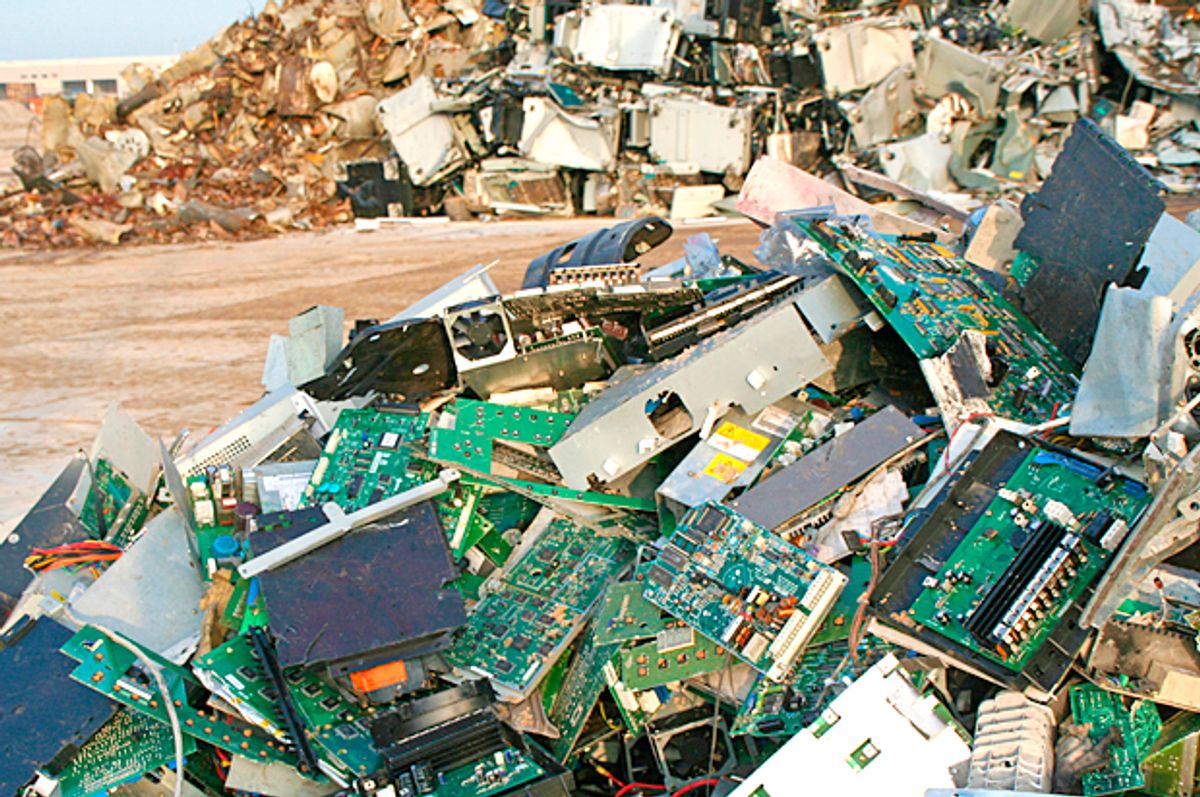It wasn't the first smartphone, and it wasn't necessarily the best one — the iPhone merely set the precedent for what a smartphone should be. As the iPhone celebrates its tenth anniversary today, the media is brimming with think-pieces about the ubiquitous gadget and its technological legacy. Yet the ultimate legacy of the iPhone is not so much how it shaped future smartphone design, but rather how it changed our culture and society, sometimes for the worse.
Ford’s Model T serves as an apt metaphor. As with the Model T, the legacy of the iPhone won’t necessarily live on in the object itself. Indeed, no one drives Model Ts anymore — just as few use the first-generation iPhone by now. Yet the Model T made personal car ownership normal, and its popularity spawned offshoots, competitors, and the growth of a massive infrastructure to support the personal automobile — from traffic lights to gas stations to highways. In other words, the Model T ushered in the age of the auto, just as the first iPhone ushered in the age of the smartphone.
Yet many of the changes wrought by automobiles, social and political shifts that once seemed progressive, we now regret: widespread car adoption has soiled the planet, fueled oil wars, spurred suburbanization, and paved over the United States with 4 million miles of roads. The promise of automotive freedom has given way to mundanity: nowadays, mostly people use their cars for chores, to run errands and commute to work, while over 2 million Americans are injured every year in car accidents.
A hundred years from now, when the “cool” factor has worn off and the iPhone 8 looks as antiquated as the Model T, we won’t remember the technical minutiae that tech journalists obsessively reported on — things like the contents of the next iOS update or Apple’s internecine war against Adobe Flash — but rather the social changes engendered by these ubiquitous devices. And though it's doubtful that anyone will still be using an iPhone 7 in 2117, future humans will still have to reckon with the unfathomable amount of e-waste left over from their production and consumption.
That’s partly because the iPhone, like many smartphones, has a very short half-life: the “tick-tock” release cycle, whereby Apple changes the newest model's numerical designation every other year, is designed to spur consumer desire and encourage a 2-year upgrade cycle. Apple knows its iPhones are essentially disposable, and designs them that way: the iPhone is built with pentalobe screws that make it difficult to crack open and fix if something breaks, a design decision that helps feed Apple’s bottom line. Rumors of iPhone models 2 years off circulate before next year’s model has even been released. Apple likes to quote the statistic that a billion iPhones have been produced — though given their short usable lifespan, that also means that within ten years, probably all billion of those will be sitting in a mountainous landfills. Not to speak of the waste produced in mining the raw resources or producing the phones in city-size factories.
The smartphone has also utterly changed the way in which we are surveilled, and the way that our government surveils others. In the olden days, if you wanted to track someone within meters and record their actions and conversations, you’d have to actively dispatch a spy to bug one’s apartment. No more: the NSA has developed tools to spy on anyone with a smartphone, and Edward Snowden believes that they can even do so when the phone appears to be turned off.
Yet by far the darkest legacy of smartphones is how they have changed labor, both full-time and contract work. Desk jobs used to be just that: jobs that you leave at your desk, or at least bring home only within the vicinity of your computer. In a decade, that has all changed. The mass adoption of the smartphone has made millions of workers on-call 24/7, eaten away at our free time, and blurred the line between work and play. Smartphones may have freed us from landlines and desktop computers, but they’ve shackled us to our workplaces.
The smartphone can be a taskmaster, and for some workers, it becomes their boss. So-called gig economy companies, like Uber, Lyft, Taskrabbit and Postmates, exist only because of the ubiquity of the smartphone. These companies use the smartphone’s location-tracking features to function as dispatch tools for their workers. Yet as with all these “on-demand” apps, if work dries up, their workers — who are all independent contractors — don’t get paid for their time. The smartphone has helped usher in a future that most corporations had long dreamed of: the widespread degeneration of full-time workers into independent contractors, who are much more disposable, exploitable, and harder to organize.
When Steve Jobs introduced the iPhone in 2007, he spoke of it in reverent terms—it was a “revolutionary,” “cool” device. He played a Beatles song on its music app, and gushed over the “beautiful” album art. Perhaps we should meditate over how such a “cool” device mutated into a tool of exploitation. There is a larger parable here, the suggestion that technology is not inherently progressive, and that our tendency to inherently revere new technology may be misplaced. Like the smartphone, the automobile was once seen as a means of freedom — yet when you're breathing exhaust fumes in standstill traffic, it's hard to remember why.

Shares